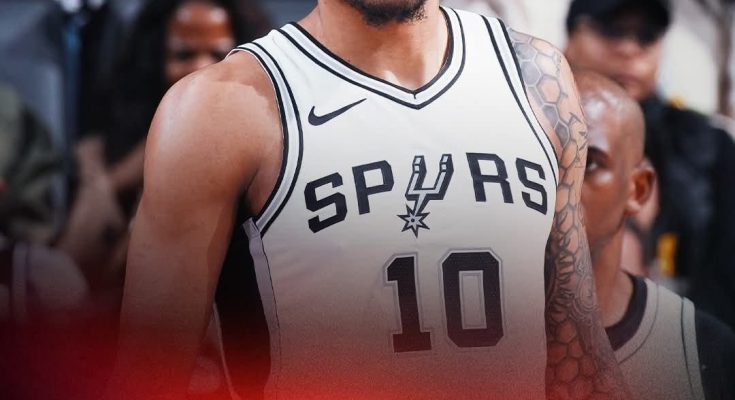According to NBA writer Kelly Iko of Yahoo Sports, the San Antonio Spurs and forward Jeremy Sochan will not come to terms on a contract extension before the rookie-scale deadline of 6:00 PM ET. The decision effectively means that Sochan will enter the upcoming NBA season playing under the final year of his rookie contract, with the possibility of restricted free agency looming next summer. While this news may not come as a total surprise to those who have followed the Spurs’ methodical approach to roster construction, it still raises interesting questions about Sochan’s future, his role alongside Victor Wembanyama, and the direction of the team as it continues its long-term rebuild.
Sochan, who was drafted by the Spurs with the No. 9 overall pick in the 2022 NBA Draft, has been one of the more unique and versatile young players in the league. Known for his defensive intensity, positional flexibility, and fearless attitude, he quickly became a fan favorite in San Antonio. His colorful personality, from his dyed hair to his expressive on-court demeanor, brought life to a Spurs team in transition. However, while his energy and versatility have been undeniable, the consistency in his offensive game has not yet caught up to his defensive potential — a factor that likely played a role in the team’s decision to hold off on an extension.
During his second NBA season, Sochan averaged around 11 points, 6 rebounds, and 3 assists per game, often shouldering multiple responsibilities for a young team still searching for an identity. Spurs head coach Gregg Popovich experimented with using Sochan as a point forward — even starting him at point guard for stretches — to expand his skill set and test his playmaking abilities. The results were mixed. While Sochan displayed flashes of brilliance facilitating the offense and defending multiple positions, there were also moments of frustration as he struggled with turnovers, inconsistent shooting, and decision-making in high-pressure situations. Yet, the Spurs have never been a franchise that rushes development. Instead, they take pride in cultivating players slowly and allowing growth to unfold naturally — a process that has historically paid off with players like Tony Parker, Manu Ginóbili, and Kawhi Leonard.
By declining to reach an extension now, the Spurs are essentially betting on optionality. They retain control over Sochan’s rights, as he will become a restricted free agent if no long-term deal is reached by next summer. That means the Spurs will have the right to match any offer sheet Sochan might sign with another team. From a front office perspective, this approach provides flexibility. It gives the Spurs another season to evaluate his fit alongside Wembanyama, Devin Vassell, and their growing core before committing significant financial resources to him. The team is also projected to have ample cap space in the future, allowing them to maneuver strategically depending on Sochan’s development trajectory and market value.
For Sochan, the situation presents both challenge and opportunity. On one hand, the lack of an extension could be viewed as a vote of caution from the Spurs — a signal that the franchise still wants to see more before locking him up long term. On the other hand, it can also serve as motivation. A strong third season could significantly boost his value in restricted free agency, potentially positioning him for a much larger payday. Players in similar situations, such as Mikal Bridges and Jaden McDaniels in recent years, have used these moments to elevate their game and earn lucrative deals later. If Sochan can show tangible progress — particularly in his shooting consistency and offensive efficiency — he could transform what now appears to be a cautious stance by the Spurs into a long-term commitment next summer.
San Antonio’s front office, led by general manager Brian Wright, has been patient in assembling a young, flexible roster around Wembanyama. Their primary goal is clear: to build a sustainable contender that maximizes the generational talent of their 7-foot-4 French superstar. Wembanyama’s development, offensive role, and team fit will dictate many of the decisions the Spurs make in the coming years. That context is crucial when analyzing the Sochan decision. While Sochan’s defense and energy align well with Wembanyama’s skill set, questions remain about their offensive synergy. The Spurs experimented last season with Sochan as a primary ball-handler to ease pressure off Wembanyama, but spacing issues and inconsistent shooting made the fit somewhat clunky. The organization may be waiting to see how Sochan adjusts to playing more as a secondary or tertiary option — someone who cuts, defends, and hits open shots around Wembanyama’s gravitational pull.
Financially, the Spurs’ decision also makes sense within the broader NBA landscape. Rookie extensions for players drafted outside the top five often fall into a gray area between max-level commitments and modest role-player deals. Teams must balance potential versus production, and in Sochan’s case, the numbers likely didn’t justify a large extension just yet. Recent deals for similar-level players — like Patrick Williams in Chicago or Jaden McDaniels in Minnesota before his breakout — have hovered around $20-25 million annually. If Sochan’s camp was seeking a number in that range, it’s understandable that the Spurs would hesitate without seeing a more defined offensive ceiling. The Spurs, historically conservative with their cap management, prefer flexibility until their young core fully defines itself.
There’s also the human side of this equation. Sochan’s competitiveness and confidence have been part of his appeal since his Baylor days, and he’s never shied away from the spotlight. How he responds mentally to the lack of an extension will be telling. For many young players, not getting that vote of long-term confidence can be frustrating. Yet for others, it becomes fuel. Sochan has already shown that he thrives on challenges — whether it’s taking on the opponent’s best scorer or adapting to unconventional roles. If he channels that same energy into refining his offensive game, particularly his perimeter shooting and decision-making, he could make the Spurs’ decision look conservative in hindsight.
The upcoming season is shaping up to be pivotal for both Sochan and the Spurs. The arrival of new veterans to support Wembanyama’s growth, coupled with another year of continuity for the young core, will offer a clearer picture of how this group fits together. Sochan’s versatility remains one of his strongest assets. He can defend 1 through 5, operate as a small-ball power forward, and even facilitate offense in spurts. His defensive switchability is invaluable in a league increasingly defined by positionless basketball. But the modern NBA also demands spacing, and Sochan’s career three-point shooting percentage — hovering around the low 30s — needs improvement if he’s to become a long-term cornerstone. The Spurs’ coaching staff will undoubtedly emphasize that area of his game this season.
From a team-building standpoint, the decision not to extend Sochan before the deadline aligns with the Spurs’ patient and data-driven approach. They’re not in win-now mode; they’re in evaluation mode. Wembanyama’s transcendent potential changes everything, but it also raises the stakes for every supporting piece. The Spurs have to be meticulous about who stays, who complements Wembanyama’s game, and who fits the timeline of contention. Sochan, at just 21 years old, still fits the timeline. The question is whether he will develop into the kind of player who elevates the entire roster — or whether his limitations on offense will eventually prompt the Spurs to look elsewhere for frontcourt partners.
In the broader context of the league, this kind of decision is becoming more common. With the new collective bargaining agreement placing tighter restrictions on high-spending teams and emphasizing financial prudence, franchises are increasingly cautious about locking into long-term deals with non-star players. Even promising young talents are sometimes asked to “prove it” for one more season before being rewarded. The Spurs’ move with Sochan fits squarely into that trend — a calculated risk that could either save them money in the long run or cost them more if Sochan takes a major leap.
Still, this doesn’t signal any tension or discontent between Sochan and the organization. By all accounts, the relationship remains positive. Both sides have expressed mutual respect, and the Spurs’ developmental culture has long been known for its support and patience. Popovich’s track record with young players suggests that Sochan will continue to receive significant playing time and developmental opportunities. What happens next will depend on how Sochan capitalizes on them. The 2025–26 season could become the proving ground that defines his role in San Antonio’s long-term vision.
For Spurs fans, this moment feels familiar — another chapter in the team’s steady, deliberate rebuild. They’ve seen the franchise take the long view before, refusing to chase quick fixes in favor of sustainable success. Sochan embodies much of what the Spurs value: toughness, adaptability, and team-first mentality. Whether or not he secures a long-term deal now, his journey remains intertwined with the team’s evolving story. If he takes the next step in his development, there’s little doubt San Antonio will reward him.
Ultimately, the lack of an extension before the rookie deadline is not an indictment of Jeremy Sochan’s talent or work ethic. It’s a reflection of timing, strategy, and the Spurs’ disciplined approach to team building. For Sochan, the path forward is clear — continue to grow, continue to compete, and let his play determine his value. For the Spurs, it’s another year to observe, refine, and build around one of the most promising cores in the NBA. Both sides are playing the long game, and as history has shown, the Spurs usually win those.


